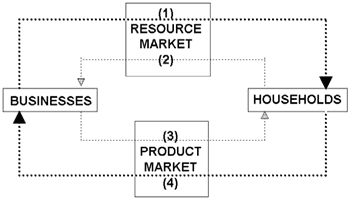|
consumer sovereignty refers to the |
|
idea that the decisions of producers and resource suppliers with respect
to the kinds and amounts of goods produced must be appropriate to
consumer demands. |
| |
|
the dollar votes of consumers ultimately determine the composition of
output and the allocation of resources in a market economy. this
statement best describes the concept of: |
|
consumer sovereignty. |
| |
|
which of the following best describes the invisible-hand concept? |
|
the
desires of resource suppliers and producers to further their own
self-interest will automatically further the public interest. |
| |
|
two major virtues of the market system are that it: |
|
allocates resources efficiently and allows economic freedom. |
| |
|
if products were in short or surplus supply in the soviet union |
|
producers would not react because no price or profit signals occurred. |
| |
|
the simple circular flow model shows that: |
|
households are on the selling side of the resource market and on the buying side of the product market. |
| |
|
the two basic markets shown by the simple circular flow model are: |
|
product and resource. |
| |
|
in the simple circular flow model: |
|
businesses are sellers of final products. |
| |

refer to the above diagram. flow (1) represents: |
|
wage, rent, interest, and profit income. |
| |
|
refer to the above diagram. flow (2) represents |
|
land, labor, capital, and entrepreneurial ability. |
| |
|
in terms of the circular flow diagram, households make expenditures in
the _____ market and receive income through the _____ market. |
|
product; resource |
| |
|
in terms of the circular flow diagram, businesses obtain revenue through
the _____ market and make expenditures in the _____ market. |
|
product; resource |
| |
|
in the circular flow model: |
|
households sell resources to firms |
| |
|
(consider this) in 1975 mcdonald's introduced its egg mcmuffin breakfast
sandwich, which remains popular and profitable today. this longevity
illustrates the idea of: |
|
consumer sovereignty. |
| |
|
(last word) according to economist donald boudreaux, the world's tens of
billions of individual resources get arranged productively: |
|
because private property encourages people to consider the alternative
uses of their resources and select those that provide the most rewards |
| |
|
which of the following is a distinguishing feature of a market system? |
|
wide-spread private ownership of capital. |
| |
|
of the following countries, the one that best exhibits the characteristics of a market economy is: |
|
Canada. |
| |
|
the term laissez faire suggests that: |
|
government should not interfere with the operation of the economy. |
| |
|
economic scarcity: |
|
applies to all economies. |
| |
|
economic systems differ according to what two main characteristics? |
|
who owns the factors of production, and the methods used to coordinate economic activity. |
| |
|
which of the following is not a characteristic of the market system? |
|
government ownership of the major industries. |
| |
|
which of the following is a fundamental characteristic of the market system? |
|
property rights. |
| |
|
the pursuit of self-interest: |
|
gives direction to the market system. |
| |
|
competition means that: |
|
there are independently-acting buyers and sellers in each market. |
| |
|
the division of labor means that: |
|
workers specialize in various production tasks. |
| |
|
barter: |
|
entails the exchange of goods for goods. |
| |
|
which of the following is one of the five fundamental questions? |
|
what goods and services will be produced? |
| |
|
the market system's answer to the fundamental question "who will get the goods and services?" is essentially: |
|
"those willing and able to pay for them." |
| |
|
the market system's answer to the fundamental question "how will the system promote progress?" is essentially: |
|
"through the profit potential that encourages development of new technology." |
| |
the advent of dvds threatens to eventually demolish the market for videocassettes. this is an example of:
|
|
creative destruction. |
| |
